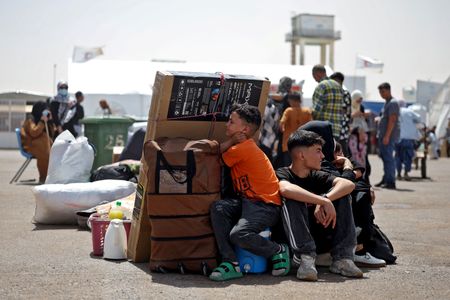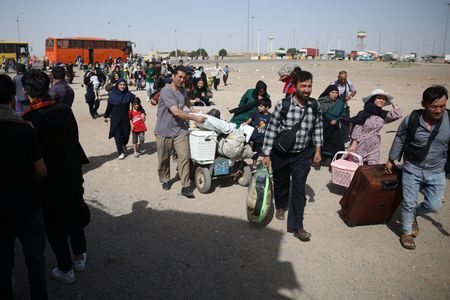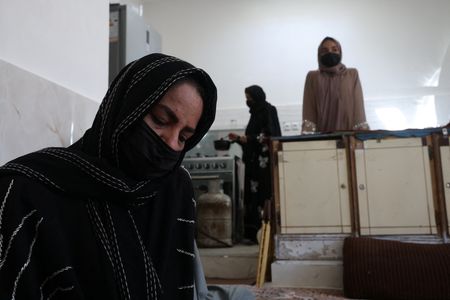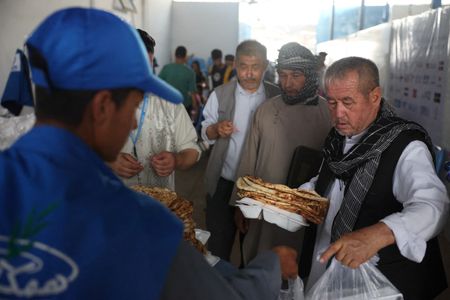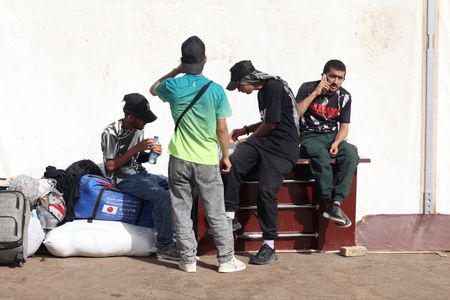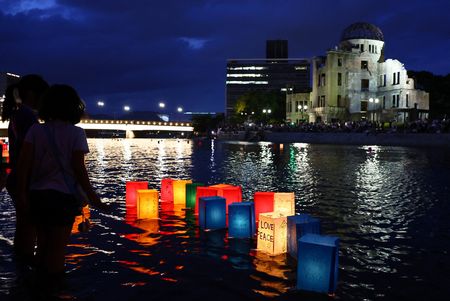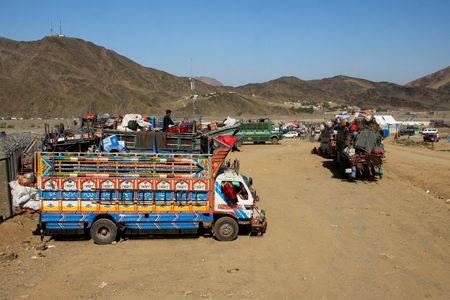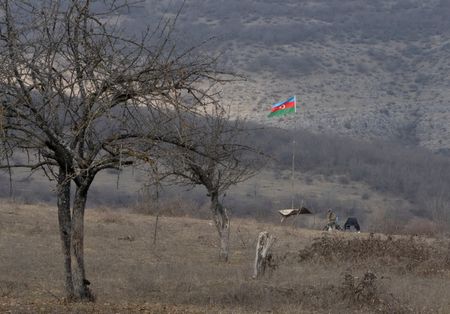ISLAM QALA, Afghanistan, August 7 (Reuters) -Habiba, an Afghan woman who fled Taliban rule to pursue a master’s degree in engineering in Iran, was deported in July just before she was about to complete her studies.
The 31-year-old, who declined to give her family name for fear of repercussions, said she returned to her homeland with little more than her laptop and documents, the last traces of a future she nearly secured, one of hundreds of thousands forced to return in recent weeks as Iran ramped up expulsions of Afghans in the wake of its war with Israel.
“I was so close,” Habiba told Reuters at the Afghan border post of Islam Qala. She said she had just saved enough to complete her thesis, the final step before graduation, and now will have to start over in a country where women are barred from high school, let alone university.
Aid agencies say accusations by Iranian authorities that Afghan nationals were spying for Israel triggered a surge in deportations, with the UN refugee agency UNHCR reporting nearly 700,000 Afghans expelled from Iran since the beginning of June. The two countries share a 920-km (550-mile) land border through a flat, arid landscape.
Iranian officials maintain those deported were undocumented and most left voluntarily, citing security and resource concerns. Interior Minister Eskandar Momeni said in July that 70% of the 1 million who left since March did so by choice, local media reported.
Local media quoted Nader Yarahmadi, an adviser to Iran’s Interior Ministry and head of its Centre for Foreign Nationals and Immigrants Affairs, as saying that temporary census cards held by about 2 million Afghan nationals were invalidated from March and that they had until July to leave. An additional 2.1 million Afghans in Iran had no documents, he said.
The number of Afghans returning exploded after Israel and Iran fought a 12-day war in June. UNHCR estimates Iran deported an average of more than 30,000 Afghans each day during the war, up 15-fold from about 2,000 earlier.
But Iranian officials have downplayed espionage claims as isolated media reports. The crackdown is on illegal immigrants, Yarahmadi said.
Aid workers at Islam Qala said some of the returnees arrived after days without food or water. Momeni said deportations were conducted with “respect and dignity,” but admitted the war triggered rushed exits, leaving many without their wages or possessions.
Reuters interviewed 26 Afghans who had recently returned from Iran, many of whom described coming home to a country that now feels unfamiliar and unlivable. Most of them denied they were illegal immigrants in Iran and said they had held some form of documentation.
BACK TO CONFINEMENT
Rahela, 37, said she had built a steady livelihood in Tehran as a certified makeup artist and seamstress. Now back in the Afghan city of Herat with her two daughters, she says she sees no future.
She says she separated from her husband several years ago after he struggled with drug addiction, and has been raising her daughters alone ever since.
The Taliban’s restrictions bar women from most forms of employment and from travelling long distances without a male guardian.
“I have no helper and no male guardian (mahram),” she said. Her father, although a mahram, is elderly and unable to accompany her or provide support, leaving her effectively confined, she said.
The flood of refugees returning to Afghanistan from Iran and Pakistan is straining aid in a country already grappling with economic collapse, donor fatigue and a ban on girls’ secondary education.
But it is the post-conflict purge from Iran that has overwhelmed Afghan authorities and aid workers, many of whom say they were unprepared for the scale and speed of the deportations.
The Taliban-led government has urged Iran to proceed gradually, and allow returnees time to settle financial affairs and retrieve personal property.
While the women who have returned spoke of lost rights and opportunities, Afghan men described split families, derailed plans and an uncertain future.
Rahim Uzbek, 59, said he was arrested at his job as a security guard, deported alone, and is now living in a mosque near the Islam Qala crossing, away from his two wives and seven children who remained in Iran, although they were also Afghan nationals.
He said that he had some money tied up in an advance payment for rent in Iran, but the landlord did not return it.
“I have no assets or savings, nor do I have any shelter or place to stay,” he said, with tears in his eyes. “I have no idea what to do.”
Mansoor Ahmad, 21, a metalworker from Kabul, said he was arrested at work and deported without his family.
He said Iranian officers accused him of helping someone escape a deportation camp and beat him when he denied it.
“When I spoke, they beat me. When I stayed silent, they beat me again,” he said. “Then they put me in solitary.”
Red marks and bruises were visible on his back and shoulders, consistent with being struck or kicked.
SECURITY AND EMPLOYMENT
Iranian officials deny systemic abuse. The Iranian chargé d’affaires in Kabul, Alireza Bigdeli, said there were no official reports of mistreatment but acknowledged “some may be unhappy with the way they were treated, detained, or returned.”
Iranian authorities say they tried to prevent family separations but admit the post-war rush split some families. Students were encouraged to leave with relatives under a voluntary return plan.
While many of the Afghans said life in Iran was tough, marked by discrimination, high costs and a constant sense of being unwelcome, they still had goals. Some worked, others studied.
“The situation in Iran was very difficult,” said Rahela. “People treated us harshly. They humiliated and insulted us. But at least there was security and work. Women could work… and that was good for us.”
(Reporting by Mohammad Yunus Yawar in Islam Qala; Writing by Ariba Shahid in Karachi; Editing by Raju Gopalakrishnan)

